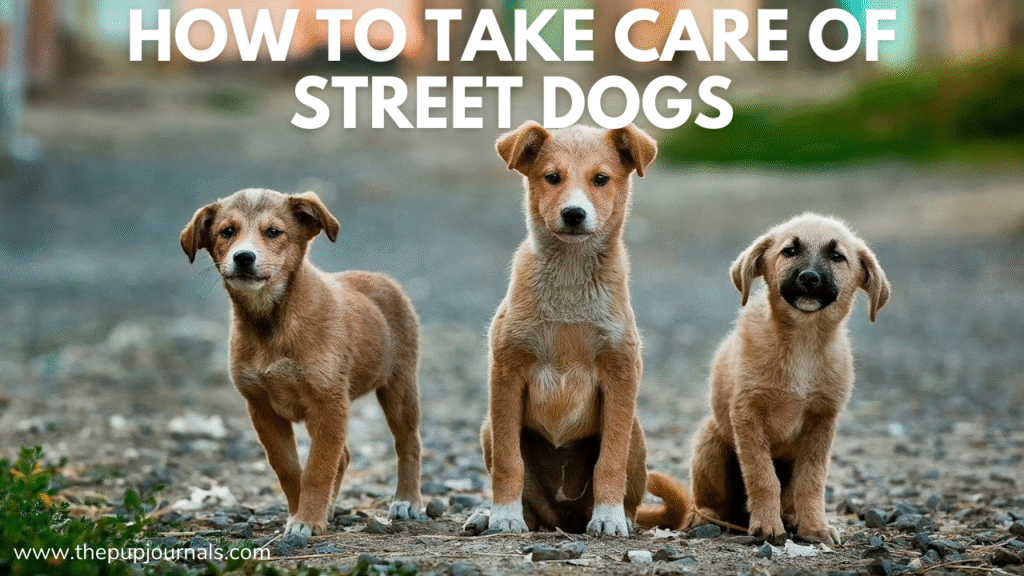
Introduction
Street dogs are everywhere in many towns and cities. They often live without proper food, shelter, or medical care. Many people want to help but don’t know where to start.
This guide explains how to care for street dogs in simple, clear steps. You’ll learn how to feed, protect, and support them. The tips here are easy to follow and safe for both you and the dogs.
By caring for street dogs, you can improve their lives and your community. Let’s explore how to do it the right way.
Understand the Needs of Street Dogs
Street dogs face daily challenges. They struggle to find clean water and safe food. They often sleep in unsafe places, may suffer from injuries, infections, or parasites. Many are scared of humans due to past abuse. Understanding these needs helps you give the right care. Every small act of kindness can make a big difference.
Approach Street Dogs Safely
Always approach street dog slowly and calmly. Sudden moves can scare them. Keep your body relaxed and avoid direct eye contact. Let the dog sniff you before touching. Use a soft voice to build trust. Never corner or chase a street dog. If the dog seems aggressive, keep a safe distance. Safety is important for both you and the animal.
Provide Clean Water Daily
Water is the most basic need for street dog. Place a clean bowl of fresh water in a safe spot. Change the water at least once a day. Use a heavy bowl so it doesn’t tip over. In hot weather, check the water more often. Hydration keeps street dog healthy and active.
Offer Nutritious Food
Street dog often eat garbage or spoiled food. This can make them sick. Offer fresh, safe food instead. Cooked rice with boiled chicken or vegetables works well. Avoid spicy, salty, or oily foods. Feed them at the same time each day. Routine helps them feel secure and trust you more.
Create Safe Shelters
Street dog need protection from heat, rain, and cold. You can build a simple shelter using wood or cardboard. Place the shelter in a quiet, safe area. Add blankets or straw for warmth. In winter, make sure the shelter stays dry and insulated. In summer, provide shade and airflow.
Give Basic Medical Care
Street dogs often suffer from untreated wounds or diseases. If possible, take them to a vet for a checkup. Vaccinate them against rabies and other common diseases. Deworm them regularly to prevent parasites. If you can’t take them to a vet, contact local animal welfare groups for help.
Spay or Neuter Street Dogs
Spaying and neutering control the street dog population. This reduces fights, injuries, and the spread of disease. Work with local vets or NGOs to arrange sterilization. Many offer free or low-cost services for street dog. After surgery, give the dog a safe place to recover. Provide food, water, and gentle care.
Protect Street Dogs from Harm
Street dog face dangers from traffic, abuse, and other animals. Help keep them safe by creating awareness. Talk to neighbors about treating street dogs kindly. Report abuse to local authorities or animal welfare groups. If possible, place reflective collars on street dogs to make them visible at night.
Socialize Street Dog Slowly
Some street dogs are friendly, while others are shy or scared. Socialization helps them trust humans again. Spend time near them without forcing contact. Offer treats and speak softly. Over time, they may allow petting or play. Patience is key when working with street dog.
Work with Local Animal Groups
Many animal welfare groups focus on helping street dog. Partnering with them increases your impact. They can provide medical care, sterilization, and adoption support. They may also help with food and shelter supplies. Join community programs that promote street dog welfare. Together, you can help more dogs.
Keep the Area Clean
Feeding street dogs in dirty areas can spread disease. Always clean the feeding spot after meals. Dispose of leftover food and trash properly. This keeps the area safe for both dogs and people. Clean surroundings also reduce complaints from neighbors.
Help Street Dogs Find Homes
Some street dogs can adapt to home life. If you find a friendly dog, consider fostering or adopting. Share their photos and stories on social media. Ask friends and family to help find homes. Adoption gives street dogs a safe, loving future.
Care for Sick or Injured Street Dogs
If you see a sick or injured street dog, act quickly. Contact a vet or animal rescue group. Keep the dog calm and warm until help arrives. Avoid moving them too much if they are in pain. Quick action can save a dog’s life.
Educate Others About Street Dogs
Many people fear or dislike street dogs. Education can change this. Share facts about their behavior and needs. Explain how kindness benefits both dogs and communities. Encourage others to help with feeding, shelter, and medical care.
Support Street Dog During Extreme Weather
Street dog suffer in extreme heat, cold, or storms. In summer, provide shade and extra water. In winter, offer warm bedding and shelter. During heavy rain, keep them dry and safe. Small actions during bad weather can save lives.
Build Trust Over Time
Street dos may not trust you right away. Be patient and consistent. Feed them regularly and speak gently. Avoid sudden moves or loud noises. Trust grows slowly but lasts a lifetime.
Keep Records of the Dogs You Help
If you care for many street dogs, keep notes. Record their appearance, health, and vaccination dates. This helps track their needs and medical history. It also helps if they need vet care later.
Conclusion
Caring for street dog is an act of kindness that changes lives. With food, water, shelter, and medical care, they can live healthier, happier lives.
Work with local groups, educate others, and stay patient. Every small effort counts. Street dog may not have homes, but with your help, they can have hope.
Read More: https://helpanimalsindia.org/news/library/saving-indias-street-dogs-from-abc-to-arv
Read More: First Aid for Limping Dogs: A Simple Guide to Help Your Injured Pet

